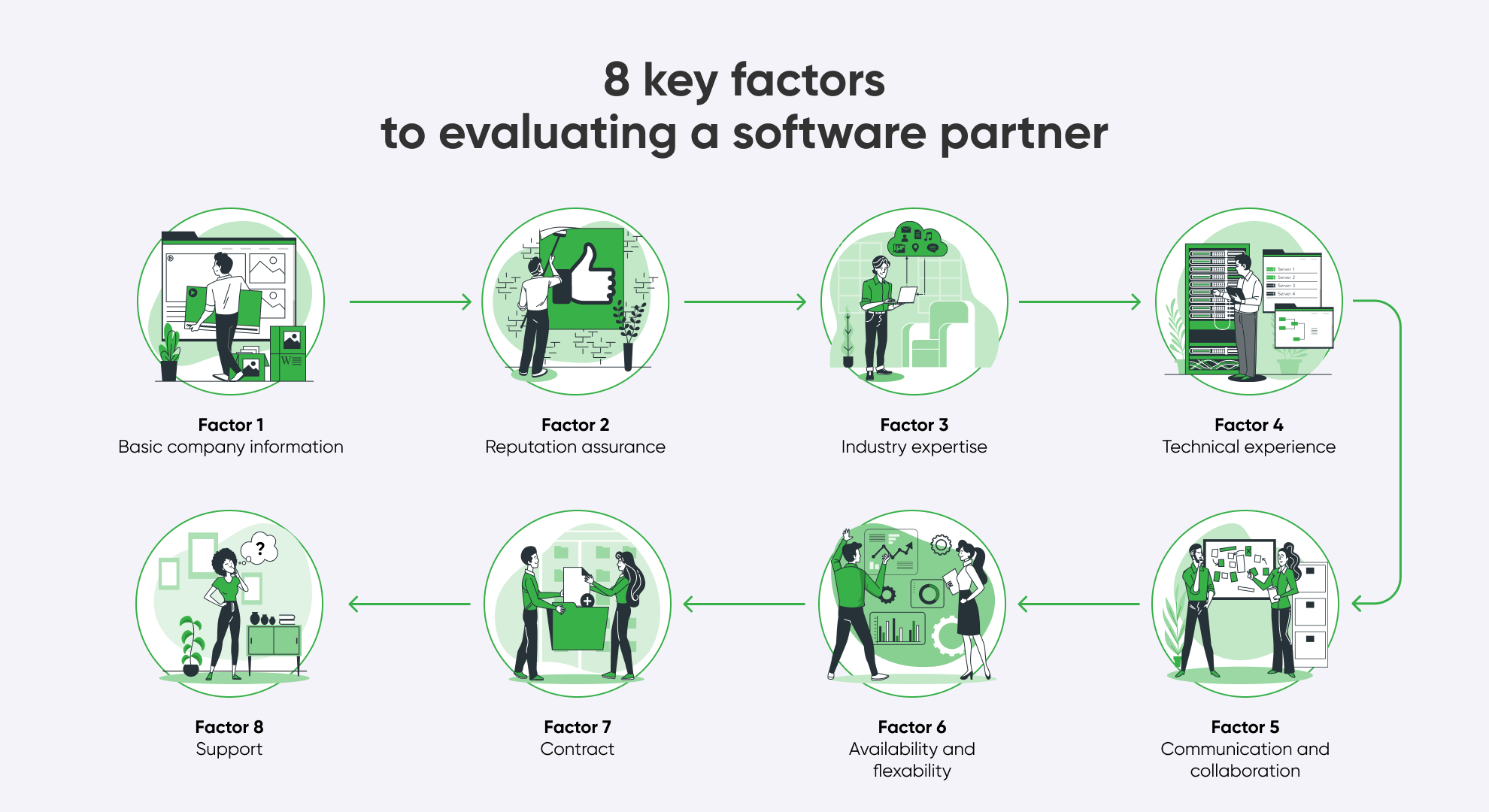The software vendor market has become very saturated over the years. According to Deloitte research, more and more companies will require digitalization in most industries. The number of suppliers has also increased significantly as software development services become readily available. These services can be delivered completely remotely, regardless of where your business resides. However, there are pros and cons of doing business this way. You can benefit from the expertise of international companies, but you can also get stuck on a one-way street due to incompatible software solutions.
Suppose you are in the transportation, logistics, or supply chain industry. In this case, you will need a logistics software development partner with the appropriate level of industry experience to quickly understand and solve your business challenges. We have previously discussed some concerns about how to choose a partner for software development. However, here you will find valuable information for a detailed assessment of your future software partner. You will also have access to downloadable files to improve your benchmarking.
8 key factors to finding and evaluating a software development partner
So, let's focus more on the detailed aspects of finding and evaluating your business partner. This is important for your business, not only because of the potential complexities of the industry but also because you may end up contracting for services that don't quite meet your expectations. Breaking some contracts is not completely impossible, but be warned - it is very expensive.
This is why you may be exposed to many potential risks. Therefore, we want to inform you about the expectations and goals that are critical to finding and evaluating your partner.

Here are 8 key factors for finding and evaluating a software partner:
1. Basic company info
Business lifespan. Collect data on the company's years of operation on the market to gain complete confidence in their financial stability, as well as to find out that there are no legal problems.
Company size. It is critical to find a partner that is the right size for your company. Your business partner should be neither too big nor too small. Working with a service provider that is too small may make it difficult to meet your specific needs. On the other hand, if your partner is too large, they may not pay enough attention to you. You may receive poor service and feel like an unimportant customer. In conclusion, so to speak, it is better to be a 'big fish in a small pond'.
Timezone. In many cases, finding the best software provider may require collaboration from different locations worldwide. Make sure your partner can accommodate your work time zone and that you will be able to work together for at least 3-4 hours per day.
2. Reputation assurance
Customer quotes. You should check the company website and independent sources for information. Testimonials are very important and they should appear real and come from real people.
Reviews. Use listing sources like Clutch, GoodFirms, Trustpilot, and others to find ratings and reviews of specific companies. Such platforms offer excellent lists with customer reviews, making them a very reliable place to gather up-to-date information about your potential partner. Among other things, they provide up-to-date lists of suppliers in certain industries, specializations, regions, etc.

3. Industry expertise
Relevant projects. Make sure your future partnership portfolio includes projects that are relevant to your industry and business and ask about this during your subsequent interview. Keep in mind that some of these may be hidden under non-disclosure agreements (NDAs) and may not be published online, so you won't get the knowledge you need just from the website.
Industry focus. Assess how deeply your potential software vendors understand and prioritize your industry. This may not be ideal if a company claims to cover more than 20 industries, but itself employs 20-30 people. However, in the case of a large company, this may be possible, because it is normal to provide several diverse services for different niches. But still, the best possible approach is to find a company that is an expert in your niche. Each industry has its unique nuances, so understanding them all at once is difficult.
Industry-related awards. It would be useful to determine whether the company has received recognition in the desired industry. After all, being a professional in a certain niche and having direct confirmation of this is much more important than industry-wide awards, which have nothing to do with the needs of your business.
Industrial education. Ask your potential partner if they have team members with experience in relevant industries. Here, it is also important to emphasize that understanding the industry is a critical factor when choosing a development partner. Each industry requires separate skills and knowledge, additional certificates, professional courses, and the like.
✅ Download the template here

4. Technical experience
Relevant technologies. When choosing a partner, pay crucial attention to the technology stack. For example, if you want to do scaling or optimization of an existing project, most likely you are already working with certain technologies and plan to continue with them. In any case, aim for a solution that will allow for optimization and easy adaptation in the future.
Relevant projects. Assess your potential partner's portfolio for projects that use similar technology stacks and are of comparable size. Keep in mind that developing a small MVP is very different than building an enterprise system.
Technology-related awards. Pay attention to IT awards; it's good if your future vendor has some. They are a good example of demonstrating real success stories, as well as recognizing the professionalism of the company and its reputation.
Integration experience if required. Ask for a list of integration experiences, as this can be very important when it comes to connecting different systems and technologies in the supply chain.
Own tools and frameworks. Assess whether the company has the tools to speed up development. Actually, you need to understand that often it would be better not to “reinvent the wheel” every time in the coding process, but to use time-tested tools. Check how well routine development processes are structured.
5. Communication and collaboration
Speed and quality. Remember that daily communication with a potential partner is crucial, so evaluate how quickly and professionally they respond. It is important to understand that you can easily find a common language and have no barriers.
After-meeting feeling. Think about how you feel after your first or subsequent one-on-one meetings with your partner's team. Take note that life is too short to spend time with people you don't like.
Shared values. Finally, check to see if the partner's team understands and shares your company's goals, mission, and core values. You will have to communicate and collaborate a lot and this aspect is quite important.
6. Availability and flexibility
Engagement model. The choice depends on your needs. You may prefer that the vendor operate independently and you only be contacted by the business analyst or product owner. Or you may decide that you want to participate in meetings, such as attending planning meetings, or work together as a team to ensure smooth collaboration between your team and your partner. In any case, you need to make sure that your potential service provider can adapt to your working style. Of course, ideally, you would be better off familiarizing yourself with the interaction models that exist on the market, so you will save time at this stage. Take a look at the main commonly used models here:
Start time. Check to see if your partner is ready to get to work when needed. However, keep in mind that building a good team is a difficult task and takes time, so getting started immediately may not be possible at some point. It usually takes a month to prepare the initial team. Of course, ideally, you should create a project roadmap.
Team scalability. Even if you're starting with a small task, make sure your partner can help with other initiatives. Make sure they can quickly scale the team to meet your needs. Also, look at the project from a different perspective, and discuss their flexibility in reducing the team size after the initial release. Always agree on such options in advance and confirm your partner's willingness to accept changes.
Agile approach to development. Ask about the software development process and whether it follows an agile approach, allowing for adjustments on the fly. Along the way, you can discuss how they cope with immediate must-have changes.
7. Сontract
Pricing model. Evaluate companies based on their payment terms. Discuss a payment schedule and consider requesting advance payments. You need to identify any hidden costs and clarify payment terms after accepting the assignment.
Hourly rate. Don't choose the cheapest option. Quality requires time and investment, so the price must be reasonable. Try to use trusted sources from which you can find out about hourly rates in development, and also compare them. In general, do not get bogged down in guesses and assumptions.
Intellectual property rights. Make sure you ultimately retain ownership of the project and source codes.
Termination conditions. Specify whether you prefer a long-term contract with guarantees or whether you want the option to terminate the project after one month.
Reporting. Maintain transparency, which is key to a healthy partnership. Discuss the method of obtaining reports and monitoring progress. Select a partner with a clear reporting process.
8. Support
Responsiveness. Consider whether support will be provided by your team or partner. Remember, support is usually more effective if it is provided by a team familiar with the project.
Pricing model. The cost of support is critical and may also be part of your contract. Explore the options available and keep in mind that quality often takes time and investment, so be careful when choosing a low-cost option as it may correlate with poor quality service.
Are you in search of a reliable tech partner?
Adexin can help with advanced logistics solutions
Contact usFinal takeaway: get a clear understanding of your software partner
We discuss partnerships between your business and your software provider, as long-term business relationships are critical to building a strong position in the market. This approach allows companies to scale over time, recognizing that success in certain niches requires reliable solutions developed by experienced teams. So, you can use our comparison list to ensure you don't miss out on anything when choosing a software development partner.
Adexin is a software provider with over 10 years of experience working with SMEs in the supply chain, logistics, and transport sectors. If you want to learn more about the critical aspects of partnerships or are looking for a software development company that can enhance your projects through seamless collaboration, contact us today for a quick introduction.

